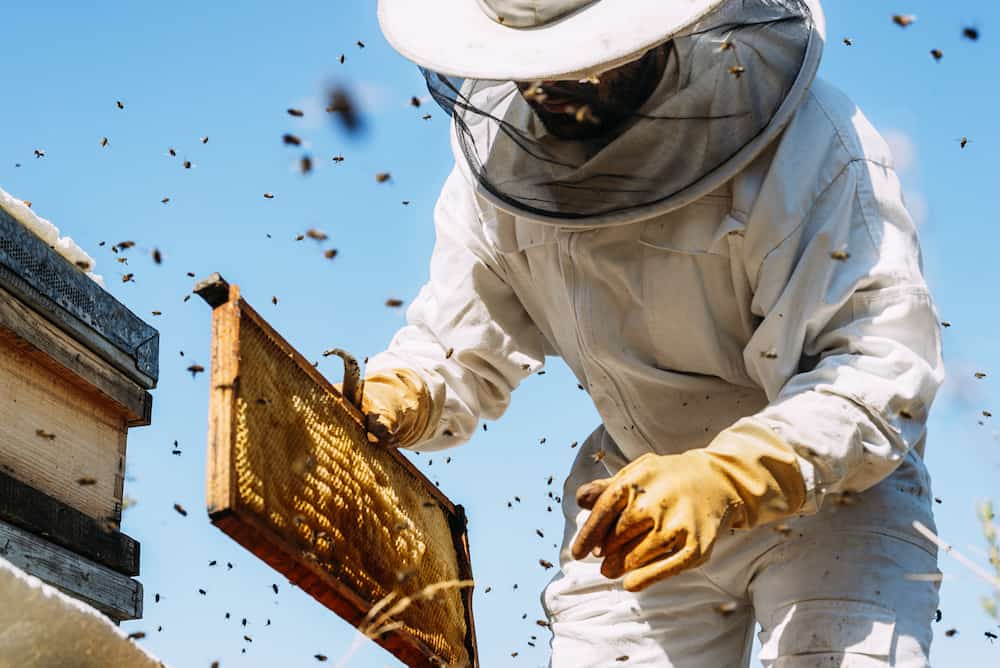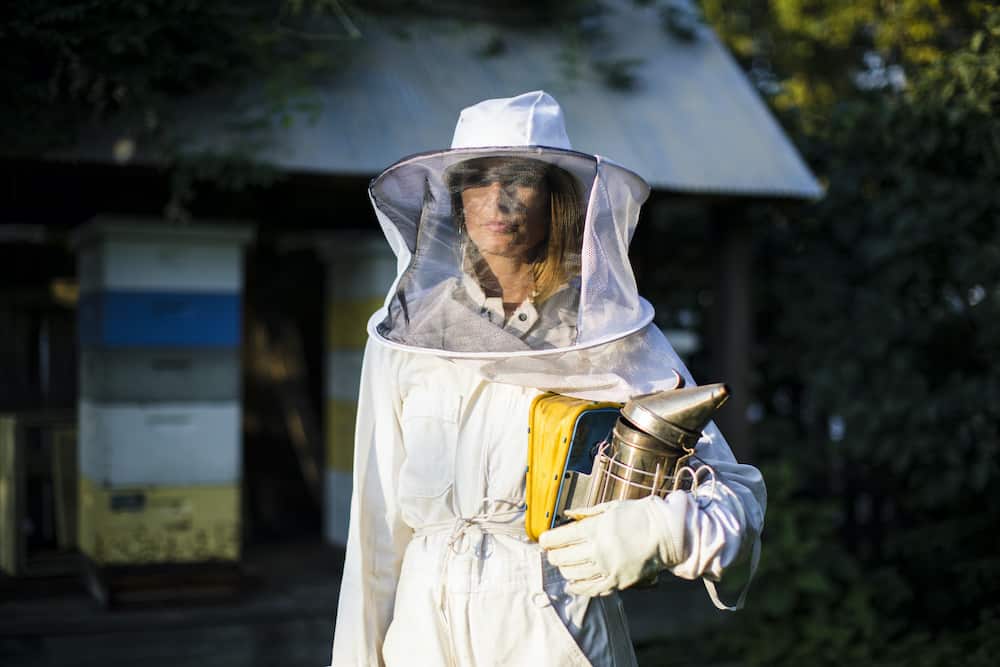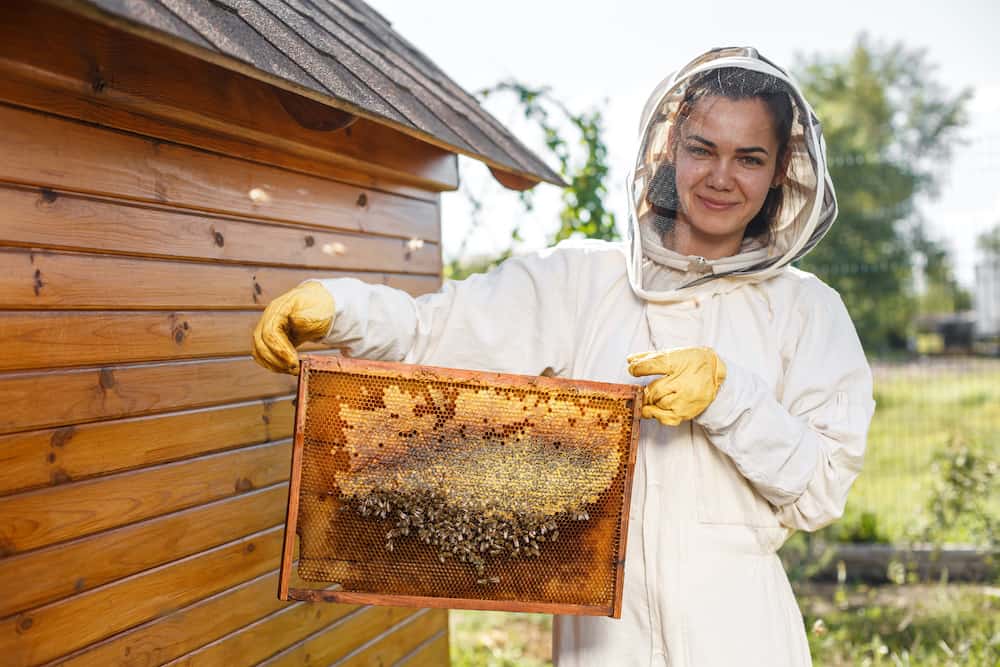Learning how to become a beekeeper can be a fulfilling experience. It’s a rewarding hobby and helps the environment as well.
Not only are bees essential to the planet, but they are also incredibly fascinating. Using the steps in this guide, you’ll be well on your way to understanding beekeeping.
Bees play an essential role in pollination. Honeybees produce or collect a variety of products that benefit people. This includes:
- Honey
- Beeswax
- Pollen
- Royal jelly
- Propolis – sticky resin collected from buds which is used as a glue in the hive
How to Become a Beekeeper
Training to become an apiarist takes a lot more effort than knowing your way around bee colonies. Before you get started, here are a few key things to consider as you become a beekeeper.
What is your purpose
As a novice beekeeper, you may not know right away if you want this to be a backyard hobby, a side business, or a career. Consider both as you start learning about it.
Research
Wherever you live, you will need to check with your village, town, or city to find out if there are ordinances and rules about having hives on your property.
If you live in a rural area, there will likely be less regulations than in denser communities where you will share closer proximity with neighbors. Some cities will require you to register your hives, while others may suggest you sign up for permits.
If you’re lucky, your area might not require any documentation at all, allowing you to manage bees at your leisure.
In addition to finding out specifically what you can and can’t do in your yard, you should also research beekeeper responsibilities.
- Read
Another essential part of the research is to make sure you read as many resources as possible. With the help of how to become a beekeeper books from the library and online articles, you can figure out whether it’s a hobby and industry you want to get into.
- Join beekeeping clubs
There are plenty of unique things attributed to working with bees, many of which you’ll learn when you join a beekeeping community.
You might also be lucky enough to find a local beekeeping organization where you can get valuable information about beehives and bees for sale that will adapt to your climate.
In these clubs, you can meet like-minded people to share ideas and discuss problems. You may potentially find a mentor to guide you through the process. Even if you don’t join right away, look online on their website.
You’ll also learn the best time to set up the hives and order bees.
- Take beekeeping classes
You may find classes at a community college, nursery, or garden center. There may even be a class online.
Allergies and fears
The two most obvious things to consider before becoming a beekeeper are whether you’re afraid of stings or allergies.
There are plenty of apiarists that can predict bee behavior to help them get out of sticky situations. However, it’s unlikely you’ll know what to look for to avoid being stung as a beginner.
Working with bees as a hobby means you’re likely to get stung multiple times, even if you’re wearing a full bee suit.
Make sure you don’t have allergies to honeybees.

How Do You Become a Beekeeper?
Once you’ve decided becoming a beekeeper is something you want to do, take these steps to get started.
1. Join beekeeping association
Associations for apiarists should be well-known in your area, especially with a quick internet search. You’ll find that they have plenty of large- and small-scale beekeepers who are always interested in sharing tips and insights.
The majority of associations will host events with expert speakers and provide reading materials for you to learn from. As you get more experienced, you can even become a mentor yourself.
We also recommend looking into workshops through your association since you can learn from people with training.
Although there are plenty of online resources, nothing beats learning one-on-one in-person.
2. Plan for the spring
Check with local beekeepers to learn when to set up the hives and order bee packages. In most areas, the ideal time is in the spring after the cold weather has passed.
3. Start small
Plan to invest in two hives. It’s far better than one since it’ll be easier to maintain your population over winter.
You’re surely not going to want to dive head-first into owning four or five hives, especially as a beginner. It’s best if you’re able to start small and scale up once you get more advice.
You’ll learn many things along the way, such as whether or not you have the ideal location.
Also, if you start small, you’ll find it’s simpler to make a plan and stick to it.
Figuring out where to put two hives instead of five will be easier to manage. Also, you can save costs when it comes to equipment.
Another important aspect of starting small is that you can work toward better honey production.
If you make any mistakes, it will be a far smaller loss of your initial investment, allowing you to learn inexpensively.
With smaller colonies, you can also build your confidence by allocating your attention more effectively.
4. Find and purchase equipment
Before you begin putting your hives together, you’ll first need to start looking for beekeeping equipment. It will be important to learn about beekeeping products you will need.
There are plenty of options, such as different-sized honey boxes, protective equipment, and smokers.
When you’re sourcing your equipment, you’ll want to make sure that it’s affordable and long-lasting.
Since you won’t be replacing your honey boxes every year, they need to be built to withstand plenty of use.
For example, most keepers use standard Langstroth equipment for quality assurance. Topbar hives are another popular option aside from medium-size honey boxes.
Just like your hive equipment, all of your tools should also be of the highest possible quality. You’ll want to pay close attention to your smoker and hive tools because you won’t want to replace them regularly.
Essential equipment
Becoming a beekeeper means you will need the following:
Hives
You’ll surely need a home for your bees with Langstroth hives being the most popular.
Topbar hives are a second choice, but the type you choose depends on your needs. For example, you’re likely to choose a different type of hive for your business than for your homestead.
Be sure to purchase new hives or make your own hives. Used beehives may have had diseased colonies, parasites, mites, etc.
Again, begin with two bee hives and you can scale from there if you want to expand to sell more pounds of honey. As you learn more, you may choose different hive designs or hive boxes.
Frames
Frames are essential for allowing your bees to produce honey, lay brood, and prepare for the upcoming winter.
You’ll slide the frames into the filing system in your hive. They are essential to your hive’s success.
Smoker
If you’re mostly concerned about getting stung, a smoker is a fantastic piece of equipment to have.
When you pump smoke into the hive, you’ll help your bees become more docile. Therefore, they’re less affected by your presence.
It can make it easier to access different parts of the hive without irritating the colony.
Hive tool
One of the most-used pieces of equipment in your kit will be a hive tool. It will make it easier to deal with propolis, the material used to keep hives together.
When you need to pull your frames apart, the hive tool is also the most useful.
Feeders
A few times, you’ll have to supplement your bee’s nutrition yourself throughout the year. That is where feeders come into play since they allow you to feed your bees safely.
They’re most useful when blooming has finished or while you’re waiting for blooming to begin.
With a combination of sugar and water, you can coax your bees into the feeder, allowing them to eat when needed.
It’s also a good idea to choose between a hive top and an entrance feeder since they can fit inside the hive. You won’t have to worry about pests getting into your bee’s food supply.
Queen marker
Your queen bee is easily an essential part of your colony, and as a beginner, she needs to be marked. Otherwise, you’ll find yourself spending far too much time searching for her.
Using a bright marker, you can safely tag your queen bee’s back, just so you always know where she is.
Bees and queen
Considering you’re not going to catch a swarm, you have to purchase a colony of bees. It will include the queen, drones, and worker bees.
Over time, you’ll be able to split the hives to help maintain a growing population. The colony will include a queen.
Start with two colonies of bees.
It can be better to consider a nuc instead of a hive for your first time since they’re less expensive. Since they have fewer bees, losing a nuc will be less of a loss.
They’re also easy to work with because all you have to do is transport the frames into your hive system.
If your hives aren’t showing much success, it could be time to invest in a new queen.
Alternatively, you can raise one on your own, but this can take a lot of research. Improperly introducing a queen into your hive can cause the other bees to kill her.
Protective equipment
One of the most important parts of purchasing equipment is to make sure you have enough PPE.
Honeybees can be docile, but they still have stingers like other stinging insects. You’ll not only need to think about allergies but your family and neighbors, as well.
You must confirm with all parties that it’s okay if you keep honeybees on your property.
You might also want to consider purchasing an epi-pen and having it on-site, whether you’re allergic or not.
Above all else, you should have a quality beekeeper outfit available. The suits should fit you snug without being too tight, and consider having a couple of styles available.
You can find suits designed for full hive inspections or light outfits for feeding or external inspections. If your budget allows, consider investing in a mesh suit because they prevent stings and help keep you cool.
Another aspect of ensuring you’re protected is to consider liability insurance for your property.
First, discuss your plans with your home insurer to see if they have coverage for beekeepers. If not, you can find third-party group insurance to help protect you and your home in case of emergencies.
I recommend gearing up with gloves and rubber boots because they’re as essential as a suit. Always wear it around the hives to protect from honey bee stings.

5. Hive registration
Certain areas require you to register the hives before you can begin working on them. They must be registered so that governing authorities can ensure you’re keeping up with rules and regulations.
Also, registering your hives provides essential statistical data to the government and makes it easier for you to receive information.
For example, if there’s pesticide spraying in your area, the government can contact you if you are registered.
How Much Money Can You Make Being a Beekeeper?
If you’re wondering how much money can you make being a beekeeper, the answer can differ.
From a career perspective, beginners will start with minimum wage, gradually increasing their salary to $37,000+.
On the other hand, experienced beekeepers can make upwards of $55,000, especially if you have skills.
Managing beekeepers can make up to $100,000 annually, depending on the success of the hives.
For example, the money you make from owning your bees can be higher than if you work for established apiaries. It will also depend if you are selling your own honey. In order to save expenses, it will be important to keep the hives and bees healthy.
How to Become a Beekeeper Professionally
When considering how to start beekeeping, it’s important to know how you can earn money.
Selling honey
If you own hives, you should consider selling honey because it’s highly marketable and easy to sell. With that said, you’ll need to decide how you want to sell it.
If you use a retailer, you’ll have to pay a percentage of your profits, which can be worth it initially as you build the brand. You could also opt to rent a booth at your local farmer’s market to sell honey for your desired price.
Most hives can produce up to seven gallons of honey each year. This means you can have enough to keep and to sell.
Let’s do a little math to see the potential profits you could make from selling honey. If you decide to sell your honey in eight-ounce mason jars, you’ll have 112 jars of honey.
By selling those jars for $20 each, you can earn $2,240 from a single hive.
You could also opt to keep the honey since it makes a long-lasting survival food for your family. It stores well.
Propolis cultivation
One of the exciting materials that bees use regularly is propolis. Not only does it keep the hive together, but it is also used for sanitization and disinfection.
Propolis is used in the medicinal industry, and it’s not as perishable as other hive by-products, like pollen.
You’ll also find that propolis is in high-demand, making it more valuable than honey and pollen to the right sellers.
Selling bulk wax and honey combs
As long as you can get a bulk supply of wax, you’ll find that it’s another way to make money from your hive.
You can extract your honey and then recycle the honeycomb to come up with batches of wax.
However, you aren’t bound to see much of a return on investment because bulk wax comes from hundreds of hives.
Still, there are plenty of sellers interested in the material, especially in the cosmetics industry. You can also sell beeswax to aromatherapy companies, such as candle companies.
Pollination
Experienced beekeepers can easily relocate honey bee colonies wherever they are needed for pollination. Farmers and gardeners who grow plants that produce food rely on bees.
Breeding
Another opportunity can be to breed colonies and/or queen bees to sell.
How Much Does It Cost for Hobby Beekeeping?
There are many benefits of being a beekeeper. However, you can expect to put a lot of your money into the task, just as you would with any other hobby.
You can typically spend upwards of $300 for your hive and $100 for bees for your first year.
These costs don’t include any of the other materials you’ll require.
Some people suggest using secondhand equipment, but you’ll need to consider pests and common bee diseases from used items.
It’s always recommended you buy new pieces for your hive since disease-ridden spores can last decades in hive equipment. How Long Do Honey Bees Live
Beginners might be interested in something known as starter kits, which you can find from supply stores.
When you begin to add tools and protective gear into the pile, you can spend up to $1,000 for two or three hives.
Even if you intend to sell the honey from your hives, you can expect to break even during your first couple of years.
For a glance at the costs when asking, “How much does it cost for hobby beekeeping?”, consider the following:
- Pre-built hives: $300/hive
- Packaged bees: $60/package
- Nucs: $150
- Extractor: $300-$400
- Other tools: Approximately $2,000
Also note, the beekeeping protective suit is a one-time purchase.
How Long Does It Take To Be a Beekeeper?
You can become a beekeeper within a year, especially if you do plenty of research. Anyone can work with hives, as long as you have the right knowledge and equipment. The more you can learn from locals, the more successful you will “bee.”
You can also expect to dedicate up to 30 hours maintaining one hive during your first year.
As your hives become more established and you’re more experienced with honey bee behavior, you’ll spend less time with maintenance.
With that said, there are tasks to be done during the spring, summer, fall, and winter, making it a year-round project.
You can expect to know a substantial amount about owning hives by the end of your third or fourth year. As you begin to add more hives, though, you can expect that there will always be new things to learn.
When you’re learning how to become a beekeeper, always consider the time allotment and whether or not it works for you. Along with being a popular hobby, you can earn money. Becoming a beekeeper can make money on farm with multiple income streams.

